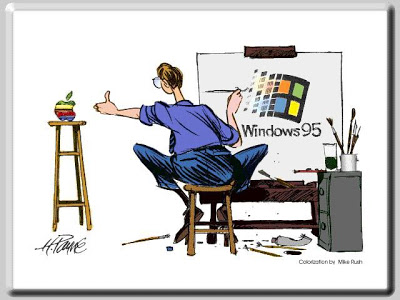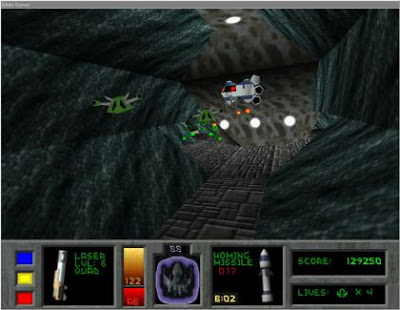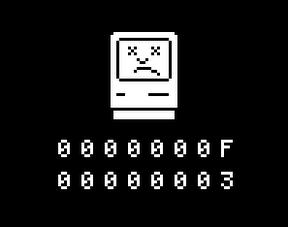This post has not been edited by the GamesBeat staff. Opinions by GamesBeat community writers do not necessarily reflect those of the staff.
Editor's note: I feel Richard's pain — I'm also a lifelong Mac user. Check out his account of the ups and downs of being a Mac gamer. -Brett

When Windows 95 came out, I didn’t care. Even though I was just a kid, I could clearly see that it was inferior to Apple's System 7.5.5. Years later I learned this wasn’t strictly true — although the feature gap was almost non-existent (despite what Microsoft's marketing suggested), they each possessed different strengths and weaknesses. But all I saw was an ugly interface, a continued reliance on the dated DOS back-end, and the infamous blue screen of death. And games still looked better on the Mac, even with my aging hardware.
Windows seemed like a window to another dimension, where somehow everything bad reigned supreme over all that was good. I didn’t like it. I wanted to close the shutters and pretend that other dimension didn't exist.
But I couldn't avoid Windows. I soon came to terms with my aversion for the OS, thanks in large part to games like Civilization 2 and a little thing called the Internet.
I had used Windows before. My brother had Windows 3.1 on his black and white Toshiba laptop, which I regularly borrowed to play Premier Manager 2, Jezzball, Ski Free, Glider 4, and Police Quest. I never took much notice of the OS or its functionality, though. I was much too focused on playing those games with the little time afforded to me. There was no magic feeling beyond that which came directly from the games, although the very concept of a laptop astounded me.
My cousin and his family were also Mac users. He introduced me to the joys of crashing cars and causing mayhem in Papyrus’ brilliant NASCAR Racing, and later to real-time strategy gem Age of Empires.

Were it not for Civilization 2, I would have likely become a complete and utter Apple fanboy. But one summer my brother went on exchange to Germany, and he let me have his laptop for the duration. As I sunk hours upon hours into Civilization 2, I grew to appreciate Windows. I saw features that were lacking on the Mac, like switching applications with Alt-Tab or by clicking at the bottom of the screen (instead of using a menu in the top-right corner), or using the Start menu to speed up various tasks. And yes, I also developed great fondness for the right mouse button, which didn't become standard on the Mac until the Mighty Mouse came out in 2005.
Still, I felt like the Mac was my friend, whereas Windows was my enemy, going out of its way to make my life miserable. When my Mac crashed, it prompted me with a message that included a cute bomb icon and a restart button instead of dropping into some mysterious blank blue screen. And when I booted my Mac up, it didn’t display an ugly DOS prompt but rather showed me a smiley-faced computer icon followed by a simple message: "Welcome to Macintosh."

My family first connected to the Information Superhighway in 1997. We had a 56k modem and 100 hours of dial-up access a month. Our primary machine was a Macintosh Performa 6400 running System 7.5.5, with a CD-ROM drive, sub-woofer, and a whopping 1.6 GB hard drive. I was ten years old, and the Internet blew my mind.
So began an amazing journey of discovery and conquest as I explored the many avenues of the World Wide Web. I soon developed a fascination with an off-shoot of the dying bulletin board systems and Internet Relay Chat programs of the late '80s and early '90s, Hotline. Through Hotline I discovered there was much more to the Internet than first meets the eye — and that the most interesting people and things tended to gravitate towards the seedier side of it.

Around this time, I first experienced the platform wars directly. Previously, I had understood that Apple and Microsoft were competing companies with incompatible products. It seemed like the one to own depended on your needs from a computer. I soon learned that this viewpoint was very much at odds with an extremely vocal minority who insisted that Macs were overpriced toys that should only be used by people with learning difficulties or who wanted a computer that looked nice but doesn’t do anything. I’ve never quite been able to grasp this mind-set. It hurt to hear people say that a computing platform I’d learned so much from was stupid and useless.
 The minority's taunts only increased when major publisher MacPlay closed its doors in April 1998, an unfortunate consequence of shrinking shelf space at retail. I knew what this news meant — Mac gaming was at breaking point.
The minority's taunts only increased when major publisher MacPlay closed its doors in April 1998, an unfortunate consequence of shrinking shelf space at retail. I knew what this news meant — Mac gaming was at breaking point.
I drowned my sorrows in Descent, a great game that one writer described as "an action 3D first-person flight simulator set indoors," and SNES9x, my first foray into the world of emulation. SNES9x allowed me to play great console games not released in Australia at that time, like Chrono Trigger and Final Fantasy 4. The trickle of ports combined with increasing support from Blizzard lured me into a false sense of security. Maybe Mac gaming would be fine after all.
I was wrong. Despite not being a big fan of first-person shooters — having spent only a little time with Quake and Marathon — the triple-whammy to Mac gaming that occurred at the end of the decade devastated me as much as the next Mac user.
It started on a positive note. Apple promised to rejuvenate the Mac gaming landscape with OpenGL support and developer assistance. They persuaded id Software to release Quake 3 simultaneously for PC and Mac. Sierra started to port Half-Life to the Mac. And Bungie was working on the game called Halo that would prove the platform’s worth.
None of it happened as planned. Quake 3 did come out, but with little assistance from Apple. Half Life for Mac was cancelled late in development. Microsoft bought Bungie, and Halo became the flagship title for the Xbox console. The rest, as they say, is history. And so began my gradual disillusionment with gaming on the Mac.
There isn’t really a difference between gaming on the PC and Mac nowadays, except that the PC gets a lot more games, Mac installation is easier, and PC hardware is typically more suited to playing the latest games. I miss the days when the Mac saw games that actually fit with its "Think Different" culture. Those were the heady days of shareware, when small companies such as Ambrosia Software, Freeverse, Pangea, and Delta Tao Software eked out a living making games that felt quintessentially Mac — where ease of use, clean interfaces, and layered complexity went hand-in-hand.
 Now those companies have been forced to go multi-platform or abandon the Mac altogether because of market realities. Mac OS X may be a fantastic operating system, one vastly superior to its predecessors, but I can’t help feeling like the Mac sold its soul to get here. Happy Mac is gone, replaced by a solid Apple logo. The modern "Aqua" look is impressive, but it lacks the charm of System 7. And Apple is spreading its wings into other electronic devices, in search of a mass audience.
Now those companies have been forced to go multi-platform or abandon the Mac altogether because of market realities. Mac OS X may be a fantastic operating system, one vastly superior to its predecessors, but I can’t help feeling like the Mac sold its soul to get here. Happy Mac is gone, replaced by a solid Apple logo. The modern "Aqua" look is impressive, but it lacks the charm of System 7. And Apple is spreading its wings into other electronic devices, in search of a mass audience.
At 23 years old, I have scarcely gone a day in my life without using a Mac. Some of my earliest and fondest memories are tied to that so-called “computer for the rest of us.” In many ways it has grown apart from me in recent years, but wherever our paths lead in the future, I know the Mac will always be a part of me. I feel deeply indebted to my nearly 20 years learning, playing, and creating on the Mac. I can only wonder whether it — or some other Apple product — will have a meaningful impact on the next 20 years of my life.
Previous article: Growing up Mac: Life with a Plus
Adapted from an article published on MacScene.
